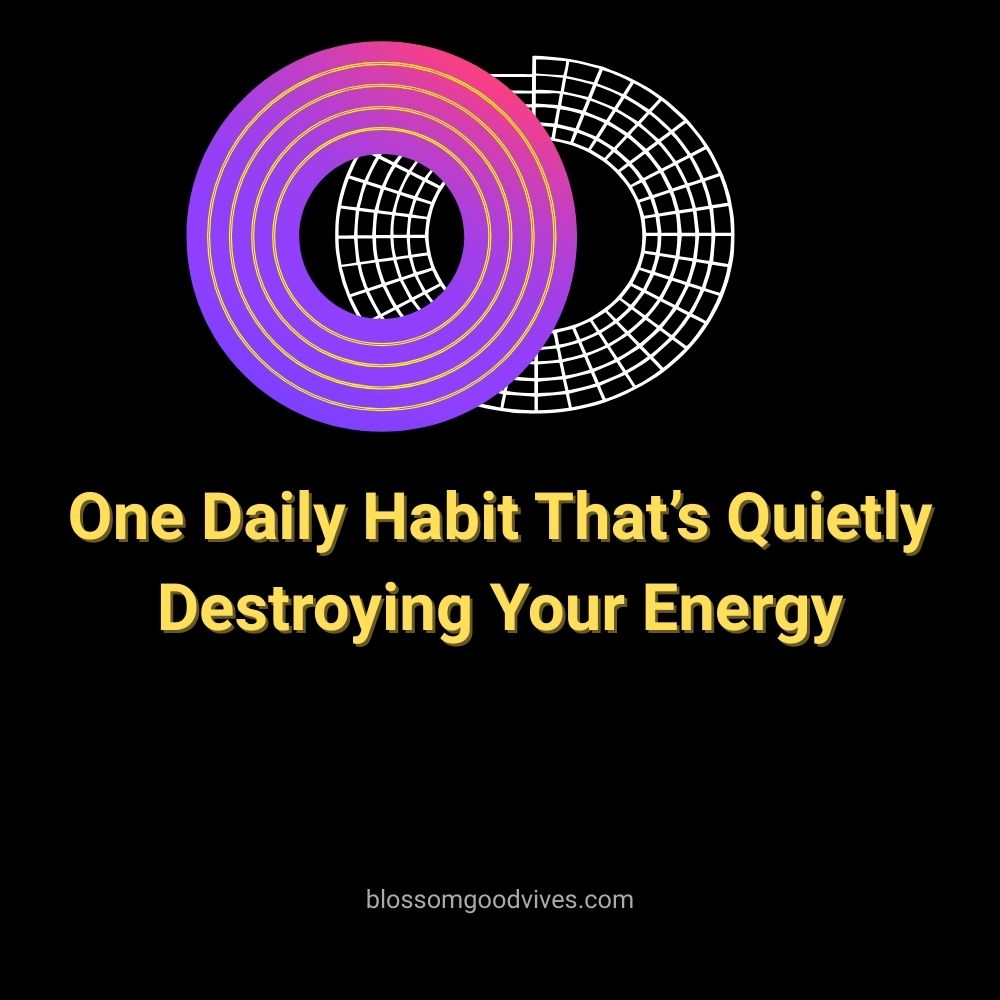
Sometimes many of us feel tired,stucked and so lazy even after a good sleep overnight.
You blame your workload, your diet, or simply not being a “morning person.” But what if the culprit is quieter, more insidious, and tucked under your pillow?
The one daily habit that’s quietly destroying your energy isn’t everytime what you eat or how much you exercise—it’s the seemingly harmless ritual of scrolling through your smartphone in bed.
This isn’t just about losing sleep; it’s about systematically dismantling the very architecture of restorative rest.
The Double Whammy: Blue Light and Cognitive Arousal
The drainage of energy occurs in two primary ways:
1. The Blue Light Sabotage:
Your body operates on a magnificent internal clock known as your circadian rhythm. As dusk falls, your brain begins producing a hormone called melatonin—the key that starts the engine of sleep. This process is exquisitely sensitive to light, particularly blue light, which has the shortest wavelength and highest energy on the visible spectrum.
Your smartphone, tablet, and laptop are masters of emitting this specific blue light. When you expose your eyes to it at night, you send a direct signal to your brain: “Stop production of sleep hormone! It’s still daytime!” A Harvard study found that blue light exposure suppressed melatonin for about twice as long as green light and shifted circadian rhythms by a full 3 hours . You might fall asleep eventually, but the quality of that sleep is fundamentally compromised. You’re essentially creating permanent, low-level jet lag.
2. The Cognitive Hijacking:
Your bed should be a sanctuary for sleep —a place your brain associates with calm and disconnection from external distraction. When you use it as a command center for emails, a window to the world’s chaos via news feeds, or a theater for dramatic social media narratives, you violate that association.
Scrolling through work emails triggers stress and anxiety, activating your sympathetic nervous system by scrolling through news cycles floods your brain with cortisol and adrenaline.
Even “fun” scrolling through social media induces a state of cognitive arousal—comparing your life to others, seeking validation through likes, and processing a torrent of information. You cannot simply switch this off. Your brain needs time to wind down, and you’re giving it a sprint finish instead.
The Ripple Effects of Poor Sleep Hygiene
The consequence of this habit isn’t just feeling a bit tired. It’s a cascade of negative impacts that prevent your entire well-being:
Reduced Sleep Quality and Quantity: You experience less deep sleep and REM sleep, the stages crucial for physical repair, memory consolidation, and emotional regulation.
Mental Energy Drain: The prefrontal cortex—the part of your brain responsible for focus, decision-making, and willpower—is exceptionally vulnerable to sleep deprivation. This is why you struggle to concentrate and make poor food choices when you’re tired.
Emotional Volatility: Without quality REM sleep, your brain struggles to process emotions. You become more irritable, anxious, and less resilient to daily stressors.
Physical Performance Decline: Your body’s ability to repair muscles, regulate hormones and maintain a strong immune system is severely hampered.
Reclaiming Your Energy: A Practical Guide to Digital Sunset
Breaking this cycle requires intention, but the rewards are immediate and profound. Think of it as a “digital sunset.”
Set a Firm Boundary: Choose a time, ideally 60-90 minutes before your target bedtime, when all screens are turned off. This is non-negotiable.
Create a Physical Barrier: Charge your phone outside the bedroom. This is the single most effective change you can make. An alarm clock is a worthy $15 investment to eliminate the excuse of “I need it for my alarm.”
Replace the Habit: Your brain is used to the stimulation. Replace it with a healthier ritual.
Read a physical book. This is the perfect analog alternative.
Practice light stretching or meditation. Apps like Calm or Headspace have audio-only guides you can play before you put your phone outside the room.
Journal: Write down three things you’re grateful for or unload your thoughts onto paper to clear your mind.
Listen to calming music or an audiobook.
Leverage Technology (Before Bed): If you must use devices in the evening, use their features against them.
Enable “Night Shift” or “Blue Light Filter” on your devices. While not a perfect solution, it helps.
Consider wearing blue-light-blocking glasses in the evening.
The Beautiful Result: A New Dawn of Energy
Within days of implementing a digital sunset, you will notice a difference. Waking up will feel easier.
Your mind will feel sharper by mid-morning. That afternoon slump will be less severe. You will have more patience and mental bandwidth to handle challenges.
Your energy is your most precious currency. Don’t let a silent, glowing habit to drain your energy each night. Reclaim your sleep, and you will reclaim your life.
References:
[1] Harvard Health Publishing. (2012, May). Blue light has a dark side. Harvard Medical School. https://www.health.harvard.edu/staying-healthy/blue-light-has-a-dark-side
[2] National Institute of Mental Health. (2022). Circadian Rhythms. National Institutes of Health. https://www.nimh.nih.gov/health/topics/circadian-rhythms
[3] Sleep Foundation. (2023, March). How Blue Light Affects Sleep. https://www.sleepfoundation.org/bedroom-environment/blue-light
[4] Chang, A. M., Aeschbach, D., Duffy, J. F., & Czeisler, C. A. (2015). Evening use of light-emitting eReaders negatively affects sleep, circadian timing, and next-morning alertness. Proceedings of the National Academy of Sciences, 112(4), 1232–1237. https://doi.org/10.1073/pnas.1418490112
